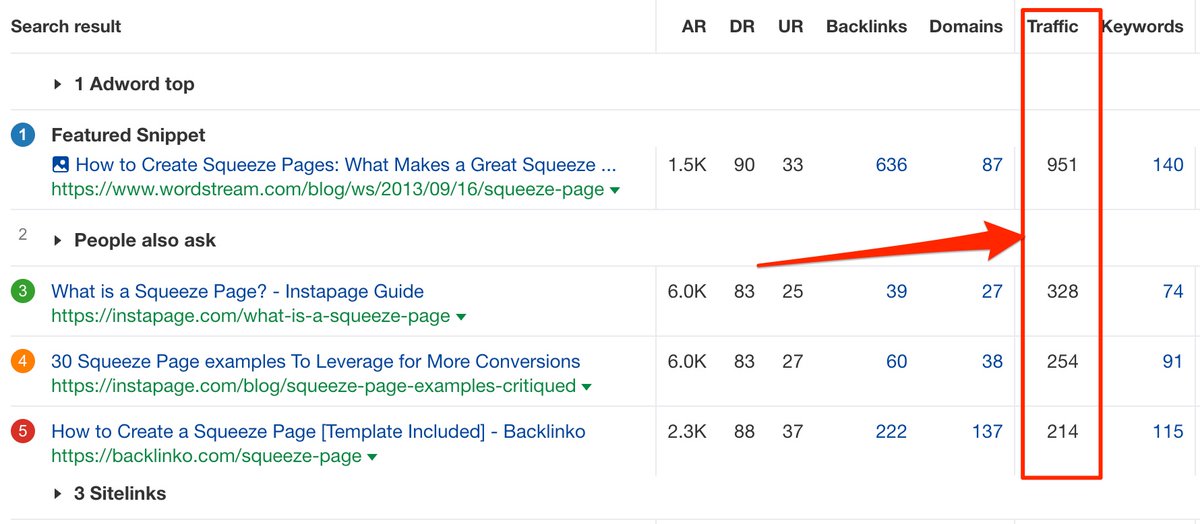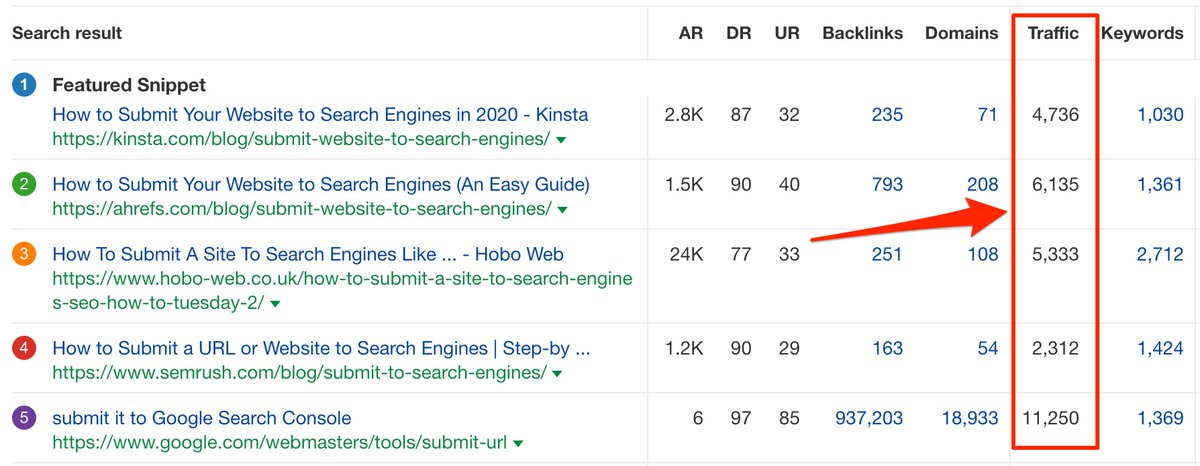
How to build backlinks.
A thread for SEO newbies. 🧵
A thread for SEO newbies. 🧵
If you want the pages of your website to rank high in Google, you will almost certainly need links.
Links from other websites tell Google that your content is notable and deserves to rank high.
So (generally) the more links you have - the better.
But how/where to get them?
Links from other websites tell Google that your content is notable and deserves to rank high.
So (generally) the more links you have - the better.
But how/where to get them?
Conceptually, there are just 4 ways to get links:
Add: Manually add links to websites.
Ask: Email website owners & ask for a link.
Buy: Exchange money for links.
Earn: Get links from people who visited your page.
(these come together into a totally un-memorable acronym — AABE)
Add: Manually add links to websites.
Ask: Email website owners & ask for a link.
Buy: Exchange money for links.
Earn: Get links from people who visited your page.
(these come together into a totally un-memorable acronym — AABE)

1. ADDING LINKS
This is when you manually add your link to some website without asking anyone's permission.
Think of different business directories & social networking sites - anyone can sign up for those and add a link.
But how valuable are such links?
This is when you manually add your link to some website without asking anyone's permission.
Think of different business directories & social networking sites - anyone can sign up for those and add a link.
But how valuable are such links?
Well..
Most of these links have little to no SEO value for your website.
Yes, there's probably a handful of legit business directories in your niche where you DO need to get listed.
But the vast majority of them are a complete waste of time.
Most of these links have little to no SEO value for your website.
Yes, there's probably a handful of legit business directories in your niche where you DO need to get listed.
But the vast majority of them are a complete waste of time.
You should totally go and register a bunch of relevant social profiles that might make sense to your website/business in the long term.
But don't expect a SEO boost from such links.
These links give you zero competitive advantage, because any competitor can easily get them too.
But don't expect a SEO boost from such links.
These links give you zero competitive advantage, because any competitor can easily get them too.
2. ASKING FOR LINKS
If you own a website, you likely received one or two (hundred?) emails from "fascinating bloggers & content writers" asking you for a link in one way or another.
Like Maisie on the screenshot below, pitching me a "unique and premium" article:
If you own a website, you likely received one or two (hundred?) emails from "fascinating bloggers & content writers" asking you for a link in one way or another.
Like Maisie on the screenshot below, pitching me a "unique and premium" article:

It obviously didn't work for her, because it is painfully clear from her email pitch that her article won't be any good.
But it did work for @SamUnderwoodUK , who recently wrote a killer guest post for Ahrefs Blog:
But it did work for @SamUnderwoodUK , who recently wrote a killer guest post for Ahrefs Blog:
https://twitter.com/SamUnderwoodUK/status/1436018655712759815
Fun fact: Sam didn't even have to pitch us. It was us, who reached out to him and suggested to contribute a guest post.
Fun fact #2: Sam actually got compensated for his work.
Because true "unique and premium" content is worth way more than just a link.
Fun fact #2: Sam actually got compensated for his work.
Because true "unique and premium" content is worth way more than just a link.
So when you reach out to someone and ask them for a link, make sure you have a good answer to the following question:
"WHAT'S IN IT FOR THEM?"
Offering a guest article is just one of the many tactics used by SEOs when they ask for links.
Here are a few more:
"WHAT'S IN IT FOR THEM?"
Offering a guest article is just one of the many tactics used by SEOs when they ask for links.
Here are a few more:

There's one BIG PROBLEM with this group of link building strategies though..
People tend to OVER-ESTIMATE THE VALUE that they are offering to the other party.
The fact that you have pointed out a broken link in someone's article doesn't mean that they would swap it to yours. 🤷♂️
People tend to OVER-ESTIMATE THE VALUE that they are offering to the other party.
The fact that you have pointed out a broken link in someone's article doesn't mean that they would swap it to yours. 🤷♂️
I recently did a small experiment of "asking for links" to one of my blog articles.
- 111 emails sent (with a 41% response rate)
- 19 links acquired
- 17% success rate
Check out my takeaways in this thread:
- 111 emails sent (with a 41% response rate)
- 19 links acquired
- 17% success rate
Check out my takeaways in this thread:
https://twitter.com/timsoulo/status/1405444094042664967
3. BUYING LINKS
I'm sure you've also received emails like this one:
I'm sure you've also received emails like this one:
https://twitter.com/timsoulo/status/1437941331335122944
Well...
Google is STRONGLY AGAINST paying for links!!
If you get caught - they penalise your website.
But let's be real..
Many SEOs DO pay for links and manage to get away with it. 🤷♂️
So whether or not you should pay for links depends on your risk tolerance and moral code.
Google is STRONGLY AGAINST paying for links!!
If you get caught - they penalise your website.
But let's be real..
Many SEOs DO pay for links and manage to get away with it. 🤷♂️
So whether or not you should pay for links depends on your risk tolerance and moral code.
Why did I mention "moral code?"
Because in many cases people pay for links when they struggle to acquire them in white hat ways.
In other words - people often pay for links when their content doesn't deserve those links in the first place.
Because in many cases people pay for links when they struggle to acquire them in white hat ways.
In other words - people often pay for links when their content doesn't deserve those links in the first place.
Think about it..
When you Google something which is very important for you...
Do you want to see pages that other people thought were valuable (and therefore linked to them)?
Or do you want to see unworthy pages that "hacked" their way to the top?
When you Google something which is very important for you...
Do you want to see pages that other people thought were valuable (and therefore linked to them)?
Or do you want to see unworthy pages that "hacked" their way to the top?
All in all, paying for links is a very controversial topic in SEO.
I'm sure many SEOs would bring up some sound arguments as to why paying for links is perfectly ethical and safe.
But here at Ahrefs we believe that links should be EARNED, not bought.
I'm sure many SEOs would bring up some sound arguments as to why paying for links is perfectly ethical and safe.
But here at Ahrefs we believe that links should be EARNED, not bought.
4. EARNING LINKS
That's when people link to you, without you having to personally ask them to do so.
Earning links is easy:
1. Create amazing content / product / service
2. Promote it to relevant audiences
3. Sit back and watch the links pile up
That's when people link to you, without you having to personally ask them to do so.
Earning links is easy:
1. Create amazing content / product / service
2. Promote it to relevant audiences
3. Sit back and watch the links pile up
You just need a few simple things to be earning links:
- a strong brand
- good reputation in your industry
- large audience / following
- original ideas / research / data
- experienced content marketing team
- vast resources to promote your content
Everyone has that, right?
- a strong brand
- good reputation in your industry
- large audience / following
- original ideas / research / data
- experienced content marketing team
- vast resources to promote your content
Everyone has that, right?
Ok-ok..
Earning links is obviously NOT easy.
But that's the whole point, right?
Take any topic, and there would be thousands (sometimes millions) of pages about it.
But only 10 of them will make it to the front page of Google and get that search traffic.
Earning links is obviously NOT easy.
But that's the whole point, right?
Take any topic, and there would be thousands (sometimes millions) of pages about it.
But only 10 of them will make it to the front page of Google and get that search traffic.
Want to be among those 10?
- build your brand
- grow your reputation
- grow your following
- conceive original ideas
- learn content marketing
- invest in content promotion
"Obstacle is the way" as @RyanHoliday would put it :)
- build your brand
- grow your reputation
- grow your following
- conceive original ideas
- learn content marketing
- invest in content promotion
"Obstacle is the way" as @RyanHoliday would put it :)
That's it!
A very brief introduction to link building for those who struggle to wrap their heads around it.
Want to learn more?
Check out my 7k words guide on link building at Ahrefs blog:
ahrefs.com/blog/link-buil…
(and please give this thread a RT if your enjoyed it 🙃)
A very brief introduction to link building for those who struggle to wrap their heads around it.
Want to learn more?
Check out my 7k words guide on link building at Ahrefs blog:
ahrefs.com/blog/link-buil…
(and please give this thread a RT if your enjoyed it 🙃)
• • •
Missing some Tweet in this thread? You can try to
force a refresh

















